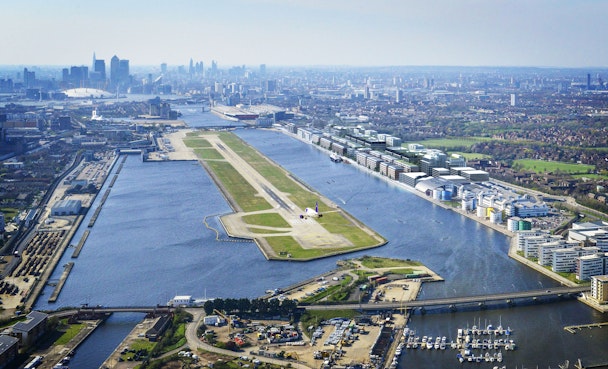Brexit? Chinese banks pile in to new London banking area for Asian business
With Britain trying to hammer out the terms of its exit from the European Union, is this the best time to start building a new financial district in London? Bloomberg asks the question today - and answers it: “China thinks so.”

London hub for Chinese banks?
Four of China’s biggest banks have this month agreed to finance the first stage of a $2.12 billion transformation of an old East End dock into a hub for Asian businesses, says Bloomberg.
And the report points out, ”To the west of the site near London City Airport, the towers of Canary Wharf stand as a reminder of how ambitious projects in the U.K. capital can remain white elephants for years before turning into cash cows.”
Chinese companies are on track to invest 4 billion pounds in London property this year, beating the 2015 record by a third, according to data compiled by CBRE Group Inc.
Though the U.K.’s vote to leave the European Union lowered prices for Chinese firms by depressing the pound against the yuan, any longer-term payoff depends partly on whether Brexit will drive down rents and values by diminishing the city’s role as Europe’s finance hub.
Michael Marx, former chief executive officer of developer U+I Group Plc, quoted by Bloomberg, said,” “Chinese investors are betting that the U.K. will do well in the Brexit talks, and if it doesn’t, companies will still choose London as their base.”
He added, “London didn’t become the financial capital of the world overnight and it certainly won’t lose that status so quickly.”
Developer ABP London and investment company Citic Group Corp. are hoping that lower rents along with the pound’s drop will attract expanding companies from China and other parts of Asia to their new hub, said Bloomberg.
Since the Brexit vote, buyers from Chinese companies have spent 600 million pounds in the U.K., according to CBRE data that excludes purchases by individuals.
China Minsheng Investment Corp. bought Societe Generale SA’s London headquarters for 84.5 million pounds. China Vanke Co. bought Ryder Court, an office building in Mayfair, for 115 million pounds and Kingboard Chemical Holdings Ltd. acquired Moor Place in the City of London financial district last month for 271 million pounds.
Commercial real estate isn’t the only market to benefit. In Canary Wharf, where banks including Barclays Plc, Citigroup Inc. and Credit Suisse Group AG are scaling down office space and workers, Greenland Holdings Corp. is hoping London homes will be more attractive than residential property at home.
This month in Beijing, the Shanghai-based company unveiled its Spire London project in Canary Wharf, set to be Europe’s tallest residential building upon completion in 2020.
A little more than 200 of the 861 units have been sold, according to a spokeswoman for the developer. Properties are priced from 693,000 pounds for a one-bedroom apartment to 1.9 million pounds for three bedrooms. Properties in Canary Wharf valued at more than 1 million pounds have fallen 8 percent since the September 2014 peak as higher sales taxes deterred buyers.
It’s not mainland Chinese piling into the British capital. “Hong Kong money is responsible for the majority of transactions that have taken place since June in London,” said Robert Noel, chief executive officer of Land Securities Group Plc, the U.K.’s largest real estate investment trust, said in an interview.

